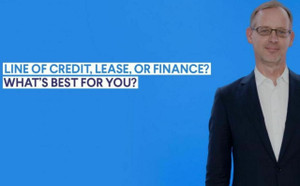Line of credit, lease, or finance? A dealer breaks down what’s best for you
By Kijiji Autos
I’m Lawrence Romanosky from Porsche Centre Calgary. If you haven’t already, please check out my Dealer Advice video where I make it simple to understand the basic differences between financing and leasing a vehicle.
If are you after a more detailed rundown of your options for paying for a new vehicle? You’re in luck, because in this article, I’ll give you a detailed look at how to choose between a line of credit, leasing, or financing.
Line of credit
The reality for most Canadians is that they will require financing of some kind to purchase a vehicle. If you decide to borrow money to make your purchase, you can source your own financing or go through your automotive dealer. Interest rates on various personal Lines of Credit (LOC) offered by banks vary considerably depending on the individual and their financial situation. They may also require a high monthly payment.
Automotive dealers have dealer agreements with many financial institutions – from all the large banks, credit unions, and the financing divisions of the manufacturers they represent. A good Finance Manager at a car dealership can shop around for the best rate for you, give meaningful guidance, and find the financial solution that works best for you.
Lease or finance?
Leasing offers some important advantages, but generally comes at a higher cost. A lease lets you accurately budget for expenses related to your vehicle. Also, by changing into a new vehicle more frequently, you will have the benefit of the latest technology and safety features. Because you are always driving a vehicle during the portion of its life where it depreciates the most, it is generally more expensive than financing and keeping a vehicle for longer. A lease is generally less flexible as well, and you can be charged for excess mileage or unexpected wear-and-tear.
Financing will generally cost less because the lending institution does not have the risk and expense of reselling the vehicle. Keeping a vehicle for longer means that the overall depreciation per year will be less than it would be when changing into a new vehicle more often. Also, financing offers more flexibility to pay down the loan earlier. A finance contract will include tax payable on the entire purchase price, whereas with a lease, you don’t pay tax on the residual value unless you purchase the car. Some provinces have very high taxes, so understanding the tax implications of your options is important.
What about incentive rates?
When automotive manufacturers compete or see excess inventory on their dealers’ lots, they offer incentives in various forms – these can be cash rebates or subsidized interest rates for lease or finance programs. Customers can often be offered a choice between a low rate or a cash discount. Sometimes these incentives are paid by the manufacturer, the dealer, or both. Knowing where the incentive is coming from can help you with your negotiations, especially since the incentives come from the manufacturer, the dealer may have additional room to move on the price by reducing their normal margin on the vehicle.
What to know before signing on the dotted line
Mistakes can happen so it’s a good idea to check the payment details on your own and then compare your results to those in the contract you’re about to sign. The more familiar you are with leasing and financing terms, and the numbers that make up the payment calculations, the better you will understand the contract that is presented to you. Always ask for a draft of the contract before you pick up the vehicle, to give yourself adequate time to review it. Once you’re ready and you need to know more about what to bring to a dealership when signing, have a look at this article.
What more do I need to know?
The most important things to consider are the overall interest cost and the flexibility of the contract. Also, estimating the depreciation of the vehicle throughout the term of the contract, and identifying at which points you are likely to have positive or negative equity, will let you know when you can trade your vehicle without having to pay a lump sum. Positive equity is the difference between the trade-in value of the vehicle and the amount you still owe; if the buyout of your loan or lease is less than the value of the vehicle then you have positive equity. Conversely, if the buyout is more than the value of the car then you have negative equity. To understand depreciation better and why it matters, check out this article.
Now that you have a better idea of the differences between leasing and financing when budgeting for a new car, head over to Kijiji Autos and find your next vehicle.
For a deeper dive into the structure and calculations behind automotive leasing and financing check out my video series where I explain these concepts in detail.
Easily find your next ride on Kijiji Autos
Search now10 Most Popular Minivans in Canada for 2024
10 Most Popular Pickup Trucks in Canada for 2024
10 Most Popular Convertibles in Canada for 2024
10 Most Popular Sedans in Canada for 2024
10 Cheapest Electric Cars in Canada for 2024
10 Most Popular Hatchbacks in Canada for 2024
Can You Buy a Car With a Credit Card?
How to Buy a Car From a Private Seller
Should I Buy a New or Used Car?
When Is the Best Time to Buy a Car?









